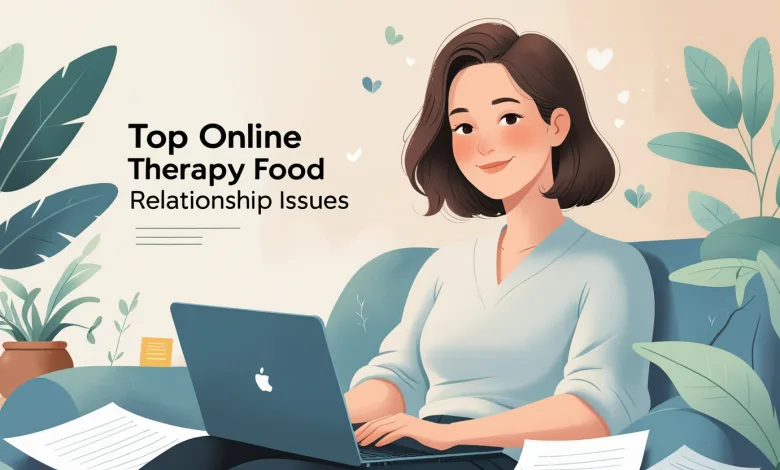Top Online Therapy Services for Food Relationship Issues

Struggling with your relationship with food? You’re not alone. This comprehensive guide explores the most effective online therapy services specifically designed to help you heal food relationship issues, from emotional eating to disordered eating patterns.
Understanding Food Relationship Issues: More Than Just Diet Problems
Let’s face it—our relationship with food is complicated. It’s not just about what we eat; it’s about how we feel when we eat it, why we’re eating it, and the thoughts swirling through our minds before, during, and after meals. Food relationship issues can manifest in countless ways, from emotional eating to restrictive patterns, binge behaviors to obsessive calorie counting. And boy, did these challenges explode during the pandemic! According to the National Eating Disorders Association, hotline calls increased by 70% during 2020 alone.
You might think, “Oh, I don’t have an eating disorder, so this doesn’t apply to me.” But here’s the thing—food relationship issues exist on a spectrum. Many of us have complicated feelings about food that don’t necessarily meet clinical criteria but still significantly impact our quality of life. Whether it’s guilt after enjoying dessert, anxiety about eating in social situations, or using food to cope with stress, these patterns deserve attention and care.
The good news? Online therapy has revolutionized access to specialized support for these challenges. No more waiting months for an appointment with the only eating disorder specialist in your area! Virtual options have made expert care accessible to anyone with an internet connection, offering specialized approaches without the need to leave your home. And let me tell you, that’s a game-changer for folks who might feel embarrassed or anxious about seeking in-person help for food issues.
Why Choose Online Therapy for Food Relationship Healing?
Online therapy for food relationship issues isn’t just convenient—it’s transformative for many people who’ve struggled to find appropriate help. For starters, it eliminates geographical barriers. Living in a rural area? No problem! You can connect with specialists who might be hundreds of miles away but have exactly the expertise you need.
Privacy is another huge benefit. Let’s be honest—many of us feel vulnerable discussing our food behaviors. Virtual sessions allow you to have these conversations from the comfort and safety of your own space, which can make opening up about difficult topics so much easier. As Dr. Rebecca Gaudino, eating psychology specialist, notes, “Many clients share food-related behaviors in online sessions that they’ve never disclosed to anyone before, simply because they feel safer in their own environment”.
There’s also the flexibility factor. Most online therapy platforms offer evening and weekend appointments, meaning you don’t have to miss work or rearrange your entire schedule to get the help you need. Plus, many services provide asynchronous communication options—think messaging or email exchanges—that allow you to process feelings about food in real-time, right when those complicated emotions arise.
The research backs this up, too! A 2023 study published in the International Journal of Eating Disorders found that online therapy for food relationship issues produced comparable outcomes to in-person treatment, with the added benefit of higher completion rates. Participants particularly valued the ability to practice new eating behaviors in their actual home environment while having therapeutic support.
Top Online Therapy Services for Food Relationship Issues
1. Equip: Specialized Care for the Full Spectrum
Equip has absolutely revolutionized the virtual treatment landscape for food relationship issues. What makes them stand out? Their five-person care team approach is pretty darn impressive! When you sign up with Equip, you don’t just get a therapist—you get a dedicated team including a therapist, dietitian, physician, peer mentor, and family mentor all collaborating on your care.
Founded by people with lived experience of eating disorders, Equip specializes in Family-Based Treatment (FBT), which has the strongest evidence base for younger clients. But don’t worry—they’ve adapted their approaches for adults too. Their services span the full spectrum of food relationship issues, from clinical eating disorders to emotional eating and food anxiety.
The platform accepts many major insurance plans—hallelujah!—making specialized care more affordable than ever. Clients particularly praise the seamless coordination between team members and the personalized care plans that evolve as their relationship with food changes. As one reviewer mentioned, “Having both a therapist and dietitian who communicated with each other made such a difference in my recovery journey”.
Best for: Comprehensive care for moderate to severe food relationship issues, especially those looking for family involvement in recovery.
2. Recovery Record: Tech-Forward Support at Your Fingertips
Recovery Record offers a unique hybrid model that combines therapist support with an innovative app-based tracking system. The app allows you to monitor meals, emotions, and behaviors while maintaining direct communication with your therapist between sessions. It’s like having a support system in your pocket!
What’s super cool about Recovery Record is how the platform uses data from your entries to identify patterns between emotions and eating behaviors, providing insights that might otherwise take months of traditional therapy to uncover. The visual representations of progress can be incredibly motivating during the ups and downs of healing your relationship with food.
Their therapists are all specialized in various evidence-based approaches for food relationship healing, including Cognitive Behavioral Therapy for Eating Disorders (CBT-E), Acceptance and Commitment Therapy (ACT), and intuitive eating principles. According to their outcomes research, clients using the Recovery Record system alongside therapy show improvements 23% faster than traditional therapy alone.
Best for: Tech-savvy individuals who benefit from data-driven insights and want continuous support between therapy sessions.
3. Foodwise: Intuitive Eating Focused Approach
If diet culture has messed with your head (and honestly, whose hasn’t it affected?), Foodwise might be your perfect match. This platform exclusively uses an intuitive eating and Health at Every Size (HAES) framework, focusing on healing your relationship with food rather than controlling weight or appearance.
Foodwise’s standout feature is their group therapy options that complement individual sessions. There’s something incredibly powerful about sharing your food relationship struggles with others who truly get it. Their “Emotional Eating Deep Dive” and “Body Peace” groups receive rave reviews from participants who found community alongside individual healing.
All therapists on the platform have advanced training in both eating disorders and intuitive eating approaches. They offer specialized pathways for different concerns, from emotional eating to recovery from restrictive eating patterns. Many clients particularly appreciate their weight-neutral approach that focuses on building healthy behaviors rather than achieving a particular body size.
Sessions range from $120-180 depending on therapist experience, and they offer income-based reduced rates through their accessibility program. While they don’t accept insurance directly, they provide superbills for out-of-network reimbursement.
Best for: Those looking to break free from diet culture and develop a peaceful, intuitive relationship with food.
4. Talkspace: Accessibility and Specialized Therapist Matching
You’ve probably heard of Talkspace as a general therapy platform, but did you know they have a specialized track for food relationship issues? Their intake process includes detailed questions about eating patterns, body image, and food-related behaviors to match you with therapists who have specific expertise in these areas.
The platform offers multiple communication options: text-based messaging, audio messages, video sessions, or some combination of these. This flexibility can be perfect for discussing food challenges as they arise. Had a difficult experience at a restaurant? You can message your therapist right afterward rather than waiting days for your next scheduled session.
Their subscription model (ranging from $260-400 monthly) provides unlimited messaging with your therapist, making it more affordable than many traditional weekly therapy arrangements. They’ve also expanded insurance coverage significantly in recent years, now working with many major providers.
Talkspace therapists use various evidence-based approaches for food relationship healing, including CBT, DBT, and ACT. While they can support many food relationship challenges, they do appropriately refer out cases of active severe eating disorders that require higher levels of care.
Best for: Those seeking flexible communication options and more affordable care for mild to moderate food relationship issues.
5. BALANCE: Virtual Intensive Program
For those needing more support than weekly therapy but wanting to avoid residential treatment, BALANCE offers a virtual intensive outpatient program (IOP) specifically designed for food relationship healing. Their program involves multiple touchpoints per week, including group therapy, individual sessions, nutrition counseling, and meal support.
What makes BALANCE unique is their virtual meal support sessions—scheduled times where you eat alongside a counselor who provides real-time guidance and support. This practical approach helps translate therapeutic concepts into actual eating experiences, which can be where many people struggle most.
Their program runs for 8-12 weeks, with gradual step-down options to less intensive care. While their comprehensive approach comes with a higher price tag than weekly therapy (approximately $4,000-6,000 for the full program), they work with most major insurance providers and offer financial aid options. Their outcomes data shows that 86% of clients maintain improvements at one-year follow-up.
Best for: Those requiring intensive support for significant food relationship challenges who want to maintain work/school commitments and stay at home.
How to Choose the Right Online Food Relationship Therapy Service
Finding the perfect match between you and an online therapy service can feel overwhelming, especially when you’re already dealing with complicated food feelings! Here’s how to narrow down your options:
Assess Your Specific Needs
Before diving into research mode, take a moment to reflect on what exactly you’re hoping to address. Are you dealing with emotional eating that kicks in during stressful situations? Obsessive thoughts about “clean eating”? Binge eating patterns? Different services specialize in different areas of food relationship healing.
Also consider what type of support works best for you. Do you prefer very structured approaches with homework and concrete goals? Or do you thrive with more exploratory, emotion-focused work? Some platforms lean heavily toward cognitive-behavioral techniques, while others emphasize intuitive eating or psychodynamic approaches.
Consider Practical Factors
Let’s face it—budgetary constraints are real! Before falling in love with a platform, check what they charge and whether they work with your insurance (if you have it). Many services offer sliding scale options or financial assistance programs that aren’t immediately obvious on their websites, so don’t hesitate to inquire directly.
Also think about your schedule and communication preferences. Some platforms offer evening and weekend appointments, while others focus on business hours. Do you want the option to message your therapist between sessions? Prefer video calls or text-based therapy? Different services have different strengths in these areas.
Ask About Therapist Credentials
When it comes to food relationship issues, specialized training matters—a lot! Look for therapists who have certifications or advanced training in eating disorders, intuitive eating, or nutritional psychology. Don’t be shy about asking potential therapists about their experience treating your specific concerns.
Dr. Jennifer Carter, sports psychologist specializing in athlete eating issues, emphasizes: “Food relationships are complex and require specialized understanding. General therapists without specific training in this area may inadvertently reinforce problematic patterns”.
What to Expect from Online Therapy for Food Relationship Issues
Starting therapy for food relationship issues can feel like a mix of excitement and nervousness. Knowing what to expect can make the process less intimidating:
The Assessment Phase
Most specialized services begin with a comprehensive assessment of your food history, current eating patterns, and related thoughts and feelings. This might involve questionnaires, food records, or detailed interviews. While this can feel intense, it’s incredibly valuable—it helps your therapist understand the full picture of your relationship with food rather than just the surface issues.
Some platforms use technology to streamline this process. For example, you might use an app to photograph meals and note emotions before and after eating for a week. This provides rich information about patterns you might not even be aware of.
This phase typically lasts 1-3 sessions, after which your therapist will collaborate with you on developing a treatment plan tailored to your specific needs and goals.
The Active Treatment Phase
Once your assessment is complete, you’ll move into regular sessions focused on changing your relationship with food. This might involve:
- Identifying emotional triggers for problematic eating behaviors
- Developing alternative coping strategies for difficult feelings
- Challenging unhelpful beliefs about food, body, and self-worth
- Gradually facing food-related fears (if avoidance is part of your pattern)
- Building mindful eating practices
- Creating sustainable, flexible routines around food
Many therapists will assign between-session practices to reinforce what you’re learning. These aren’t meant to feel like burdensome homework but rather as opportunities to try new approaches in your day-to-day life.
Registered Dietitian Sarah Adler notes, “Healing your relationship with food happens both during therapy sessions and, more importantly, in those everyday moments when you’re making food choices or experiencing food-related emotions”.
FAQs About Online Therapy for Food Relationship Issues
How long does therapy for food relationship issues typically take?
The timeline varies significantly depending on the severity of your issues and your personal goals. Mild to moderate concerns might show substantial improvement within 3-6 months of weekly therapy. More entrenched patterns or clinical eating disorders often require longer treatment, typically 1-2 years. Most people begin with weekly sessions and gradually reduce frequency as they build new skills and patterns.
Remember that healing your relationship with food is a process, not an event. Many people find that even after formal therapy ends, they continue to deepen their understanding and implementation of the principles they’ve learned.
Will my insurance cover online therapy for food relationship issues?
It’s getting better! Mental health parity laws have improved coverage for eating disorder treatment, and many insurance plans now recognize the medical necessity of treating these conditions. However, coverage varies widely between plans.
Your best approach is to:
- Call your insurance company directly and ask about coverage for eating disorders or disordered eating treatment
- Check if the platforms you’re interested in provide insurance verification services
- Ask about superbills for out-of-network reimbursement if direct coverage isn’t available
Some online platforms specifically focus on insurance coverage and can be excellent resources if cost is a major concern.
Is online therapy as effective as in-person therapy for food issues?
Research increasingly says yes! A 2022 meta-analysis published in the International Journal of Eating Disorders reviewed 36 studies comparing virtual and in-person treatment for various eating issues. The conclusion? Online treatment produced equivalent outcomes to face-to-face therapy across most measures, including reduction in disordered eating behaviors, improvement in body image, and development of healthier coping strategies.
The one area where in-person treatment sometimes showed an edge was in cases requiring very intensive monitoring, such as medical complications from severe eating disorders. For the majority of food relationship issues, however, online therapy appears to be just as effective.
How do I know if I need specialized therapy for my relationship with food?
Great question! If any of these resonate with you, specialized support might be beneficial:
- You spend significant time thinking about food, weight, or your body
- Eating causes strong emotions like guilt, anxiety, or shame
- You use food to cope with difficult feelings
- You have rigid rules about what, when, or how much you can eat
- Your eating patterns are causing physical symptoms or health concerns
- Food choices or eating behaviors are impacting your social life or relationships
- You feel out of control around certain foods
- Previous attempts to change your eating patterns haven’t created lasting results
Remember, you don’t need to be at a crisis point to benefit from support. Many people find that addressing food relationship issues earlier leads to smoother and faster healing.
Embracing Your Food Healing Journey: Final Thoughts
Healing your relationship with food isn’t just about changing what’s on your plate—it’s about transforming your internal experience around eating. The right online therapy service can be an invaluable guide on this journey, providing expert support as you navigate the complex terrain of food feelings and behaviors.
As you consider the options we’ve explored—from the comprehensive team approach of Equip to the tech-forward support of Recovery Record, the intuitive eating focus of Foodwise to the accessibility of Talkspace, or the intensive support of BALANCE—remember that the “best” service is ultimately the one that aligns with your unique needs, preferences, and circumstances.
Taking that first step—reaching out for support—is often the hardest part. But as countless clients have discovered, it can also be the beginning of a transformative journey toward peace with food. You deserve to eat without guilt, anxiety, or obsession. You deserve to invest your mental energy in living your life rather than micromanaging your diet. And with the right support, that freedom is absolutely possible.
Whether you’re dealing with emotional eating, restrictive patterns, or anything in between, remember: food relationship healing isn’t about achieving perfect eating—it’s about building a flexible, compassionate approach to nourishment that supports rather than detracts from your quality of life. And that, my friend, is a journey worth taking.






